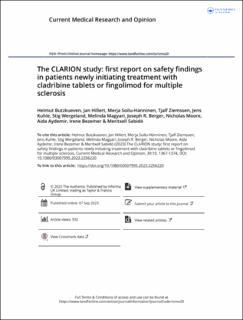The CLARION study: first report on safety findings in patients newly initiating treatment with cladribine tablets or fingolimod for multiple sclerosis
Butzkueven, Helmut; Hillert, Jan; Soilu-Hänninen, Merja; Ziemssen, Tjalf; Kuhle, Jens; Wergeland, Stig; Magyari, Melinda; Berger, Joseph R.; Moore, Nicholas; Aydemir, Aida; Bezemer, Irene; Sabidó, Meritxell
Journal article, Peer reviewed
Published version

Åpne
Permanent lenke
https://hdl.handle.net/11250/3117218Utgivelsesdato
2023Metadata
Vis full innførselSamlinger
- Department of Clinical Medicine [2044]
- Registrations from Cristin [9489]
Originalversjon
Current Medical Research and Opinion. 2023, 39 (10), 1367-1374. 10.1080/03007995.2023.2256220Sammendrag
Objectives
As part of the CLARION study: (1) characterize the incidence of severe infections, herpes zoster, and malignancies in patients newly initiating cladribine or fingolimod for relapsing multiple sclerosis (MS); (2) estimate the incidence of severe lymphopenia among cladribine users; and (3) describe prior/subsequent disease-modifying therapy (DMT) in both cohorts.
Methods
Patients were identified from seven participating MS registries/data sources. The incidence rate (IR) of each outcome per 1000 patient-years and its 95% confidence interval (95%CI) were estimated for cohorts using Poisson regression.
Results
By cut-off date (01-April-2020), 742 cladribine and 867 fingolimod users were included. Mean follow-up was ∼1 year. The IR for severe infections from all contributing sources (except Denmark) was: cladribine, 7.37 (2.76,19.6); fingolimod, 6.55 (2.46,17.4). The corresponding IR for herpes zoster was 5.51 (1.78,17.1) and 3.27 (0.82,13.1), respectively, while values for opportunistic infections were 0 (0,6.76) and 1.63 (0.23,11.6), respectively. There were no events of progressive multifocal leukoencephalopathy in either cohort. The IR of severe lymphopenia was 63.9 (40.7,100.1) in 349 cladribine users from contributing sources. The IR of malignancies (cut-off date 01-April-2022) was 3.55 (1.59,7.90) for the cladribine cohort (n = 1035) and 3.55 (1.48,8.52) for the fingolimod cohort (n = 843) from three MS registries/data sources. In the combined data sources, 36.8% of cladribine and 27.4% of fingolimod users were DMT-naïve; after initiation of study treatment, 2.5% and 20.2% switched to another DMT, respectively.
Conclusion
No new safety signal was observed in patients treated with cladribine tablets, although results are limited by a relatively short duration of follow-up.
